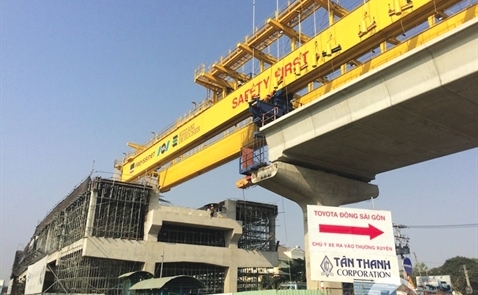|
Private
investors in infrastructure suffer disadvantages
According to the
Asian Development Bank (ADB), emerging economies in Asia, including in
Vietnam, will need $26 trillion from now to 2030 to develop
infrastructure.
 The figure is similar to recent estimates by the Ministry of Planning and Investment (MPI) that Vietnam needs $480 billion more for infrastructure projects, including 11 power plants with total capacity of 13,200 MW and 1,380 kilometers of highway. Vietnam has received invitations from ADB, the World Bank (WB) and Asian Infrastructure Investment Bank (AIIB), the new lender, to borrow capital to develop the projects. However, analysts warned that Vietnam will have to pay the price for the loans. Nguyen Tri Hieu, a renowned finance and banking expert, said in 2016, both Standard & Poor’s and Fitch gave a BB-/B credit rating to Vietnam, while Moody’s gave B1. With the ratings, Vietnam will have to pay relatively high interest rates for loans from international institutions.
Meanwhile,
the exchange rate fluctuations will increase Vietnam’s public debt burden. To
date, the public debt has nearly hit the ceiling as per Vietnam’s calculation
method and has exceeded the ceiling as per international practice.
Therefore, the government will have to think carefully before borrowing foreign money, even for infrastructure development. Seeking capital While it is more difficult to look for capital from international institutions, mobilizing domestic sources proves to be a good solution. In Vietnam, private investment in infrastructure projects just accounts for 10 percent of total investment, while the figure is 30 percent in India. This is because investment in infrastructure, in private investors’ eyes, is unattractive with high risks, high site clearance and a long time needed to take back the capital. Pham Tat Thang from the Trade Research Institute, pointed out that private investors are not interested in the infrastructure sector because they have few opportunities to develop foreign funded projects, while state-owned enterprises have better opportunities to access the projects. Analysts cited official reports as saying that the investment rate in infrastructure in Vietnam is the highest in the world – VND215 billion per kilometer, or $10 million. It is not an easy task for private investors to call for capital to develop infrastructure projects. Powerful commercial banks, mostly banks in which the state holds controlling stakes, won’t provide loans if they don’t receive guarantees in policies.
“The meat
is not reserved for private investors, while no one is foolish to get bones,”
an analyst commented.
Kim Chi, VNN
|
Thứ Hai, 24 tháng 4, 2017
Đăng ký:
Đăng Nhận xét (Atom)
Không có nhận xét nào:
Đăng nhận xét